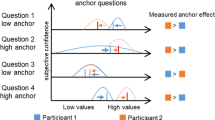Abstract
Many researchers studying individual differences conduct studies in which they ask a large number of individuals to complete a questionnaire designed to measure a specific trait. The researchers then examine whether the individuals receiving a high score on the trait measure will perform differently on a behavioral measure, or other questionnaire, than individuals receiving a low score on the trait. An implicit assumption of this methodology is that the trait dimension being measured applies equally well to all individuals. In other words, a particular individual participating in the study may receive a high score on the trait (or may receive a medium score or a low score), but every individual’s score is equally meaningful as a representation of that individual’s personality.
Access this chapter
Tax calculation will be finalised at checkout
Purchases are for personal use only
Preview
Unable to display preview. Download preview PDF.
Similar content being viewed by others
References
Allport, G.W. (1937). Personality: A psychological interpretation. New York: Holt.
Baumeister, R.F., & Tice, D.M. (1988). Metatraits. Journal of Personality, 56, 571–598.
Baumeister, R.F. (1988). On the stability of variability: Retest reliability of metatraits. Unpublished manuscript, Case Western Reserve University.
Bem, D.J., & Allen, A. (1974). On predicting some of the people some of the time: The search for cross-situational consistencies in behavior. Psychological Review, 81, 506–520.
Chaplin, W.F., & Goldberg, L.R. (1984). A failure to replicate the Bem and Allen study of individual differences in cross-situational consistency. Journal of Personality and Social Psychology, 47, 1074–1090.
Converse, P.E. (1970). Attitudes and non-attitudes: Continuation of a dialogue. In E.R. Tufte (Ed.), The quantitative analysis of social problems (pp. 168–189 ). Reading, MA: Addison-Wesley.
Fazio, R.H., Sanbonmatsu, D.M., Powell, M.C., & Kardes, F.R. (1986). On the automatic activation of attitudes. Journal of Personality and Social Psychology, 50, 229–238.
Fenigstein, A., Scheier, M.F., & Buss, A.H. (1975). Public and private self-consciousness: Assessment and theory. Journal of Consulting and Clinical Psychology, 43, 522–527.
Hovland, C.I. (1959). Reconciling conflicting results derived from experimental and survey studies of attitude change. American Psychologist, 14, 8–17.
Markus, H. (1977). Self-schemata and processing information about the self. Journal of Personality and Social Psychology, 35, 63–78.
Paunonen, S.V., & Jackson, D.N. (1985). Idiographic measurement strategies for personality and prediction: Some unredeemed promissory notes. Psychological Review, 92, 486–511.
Swann, W.A., & Hill, C.A. (1982). When our identities are mistaken: Reaffirming self-conceptions through social interaction. Journal of Personality and Social Psychology, 43, 59–66.
Swann, W.A., & Predmore, S.C. (1985). Intimates as agents of social support: Sources of consolation or despair? Journal of Personality and Social Psychology, 49, 1609–1617.
Tellegen, A. (1988). The analysis of consistency in personality assessment. Journal of Personality, 56, 621–663.
Tellegen, A., Kamp, J., & Watson, D. (1982). Recognizing individual differences in predictive structure. Psychological Review, 89, 95–105.
Underwood, B., & Moore, B.S. (1981). Sources of behavioral consistency. Journal of Personality and Social Psychology, 40, 780–795.
Editor information
Editors and Affiliations
Rights and permissions
Copyright information
© 1989 Springer-Verlag New York Inc.
About this chapter
Cite this chapter
Tice, D.M. (1989). Metatraits: Interitem Variance as Personality Assessment. In: Buss, D.M., Cantor, N. (eds) Personality Psychology. Springer, New York, NY. https://doi.org/10.1007/978-1-4684-0634-4_14
Download citation
DOI: https://doi.org/10.1007/978-1-4684-0634-4_14
Publisher Name: Springer, New York, NY
Print ISBN: 978-1-4684-0636-8
Online ISBN: 978-1-4684-0634-4
eBook Packages: Springer Book Archive




